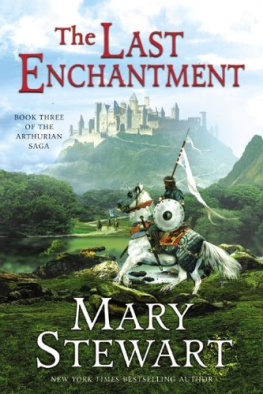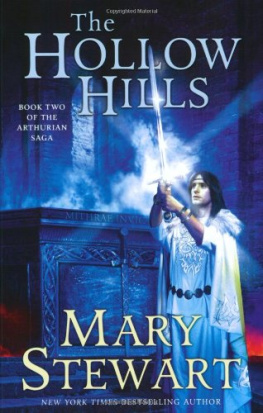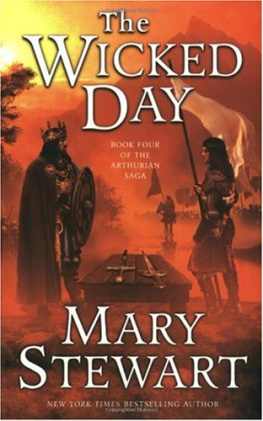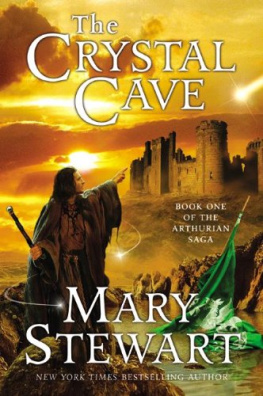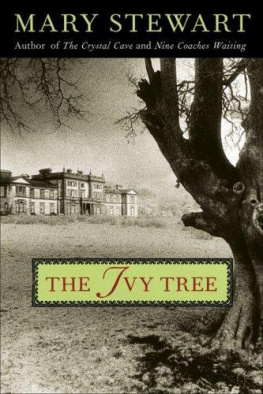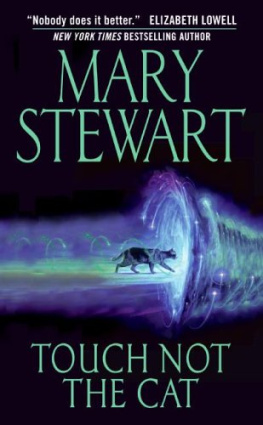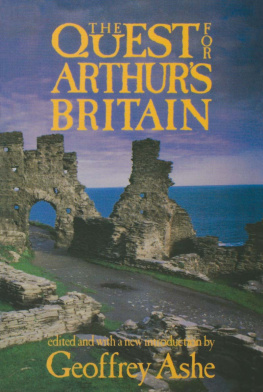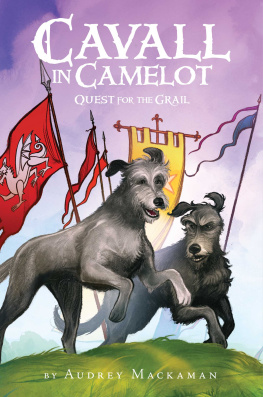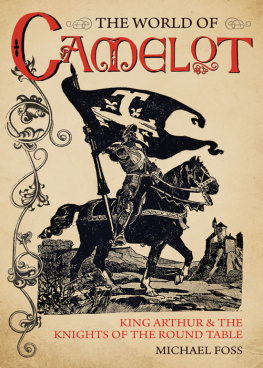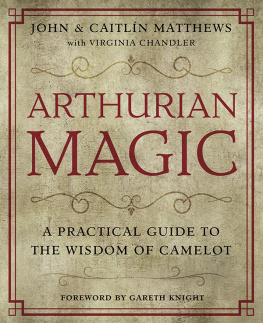Mary Stewart - The Last Enchantment (The Arthurian Saga, Book 3)
Here you can read online Mary Stewart - The Last Enchantment (The Arthurian Saga, Book 3) full text of the book (entire story) in english for free. Download pdf and epub, get meaning, cover and reviews about this ebook. year: 2003, publisher: Harper Voyager, genre: Art / Prose. Description of the work, (preface) as well as reviews are available. Best literature library LitArk.com created for fans of good reading and offers a wide selection of genres:
Romance novel
Science fiction
Adventure
Detective
Science
History
Home and family
Prose
Art
Politics
Computer
Non-fiction
Religion
Business
Children
Humor
Choose a favorite category and find really read worthwhile books. Enjoy immersion in the world of imagination, feel the emotions of the characters or learn something new for yourself, make an fascinating discovery.
- Book:The Last Enchantment (The Arthurian Saga, Book 3)
- Author:
- Publisher:Harper Voyager
- Genre:
- Year:2003
- Rating:5 / 5
- Favourites:Add to favourites
- Your mark:
- 100
- 1
- 2
- 3
- 4
- 5
The Last Enchantment (The Arthurian Saga, Book 3): summary, description and annotation
We offer to read an annotation, description, summary or preface (depends on what the author of the book "The Last Enchantment (The Arthurian Saga, Book 3)" wrote himself). If you haven't found the necessary information about the book — write in the comments, we will try to find it.
The Last Enchantment (The Arthurian Saga, Book 3) — read online for free the complete book (whole text) full work
Below is the text of the book, divided by pages. System saving the place of the last page read, allows you to conveniently read the book "The Last Enchantment (The Arthurian Saga, Book 3)" online for free, without having to search again every time where you left off. Put a bookmark, and you can go to the page where you finished reading at any time.
Font size:
Interval:
Bookmark:
Merlin #3
Not every king would care to start his reign with the wholesale massacre of children. This is what they whisper of Arthur, even though in other ways he is held up as the type itself of the noble ruler, the protector alike of high and lowly.
It is harder to kill a whisper than even a shouted calumny. Besides, in the minds of simple men, to whom the High King is the ruler of their lives, and the dispenser of all fates, Arthur would be held accountable for all that happened in his realm, evil and good alike, from a resounding victory in the battlefield to a bad rain-storm or a barren flock.
So, although a witch plotted the massacre, and another king gave the order for it, and though I myself tried to shoulder the blame, the murmur still persists: that in the first year of his reign Arthur the High King had his troops seek out and destroy some score of newly born babies in hope of catching in that bloody net one single boy-child, his bastard by incest with his half-sister Morgause.
Calumny, I have called it, and it would be good to be able to declare openly that the story is a lie. But it is not quite that. It is a lie that he ordered the slaughter; but his sin was the first cause of it, and though it would never have occurred to him to murder innocent children, it is true that he wanted his own child killed. So it is just that some of the blame should rest on him; just, too, that some of it should cling to me.
For I, Merlin, who am accounted a man of power and vision, had waited idly by while the dangerous child was engendered, and the tragic term set to the peace and freedom which Arthur could win for his people. I can bear the blame, for now I am beyond men's judgment, but Arthur is still young enough to feel the sting of the story, and be haunted by thoughts of atonement; and when it happened he was younger still, in all the first white-and-golden flush of victory and kingship, held up on the love of the people, the acclamation of the soldiers, and the blaze of mystery that surrounded the drawing of the sword from the stone.
It happened like this. King Uther Pendragon lay with his army at Luguvallium in the northern kingdom of Rheged, where he was to face a massive Saxon attack under the brothers Colgrim and Badulf, grandsons of Hengist. The young Arthur, still little more than a boy, was brought to this, his first field, by his foster-father Count Ector of Galava, who presented him to the King. Arthur had been kept in ignorance of his royal birth and parentage, and Uther, though he had kept himself informed of the boy's growth and progress, had never once seen him since he was born. This because, during the wild night of love when Uther had lain with Ygraine, then the wife of Gorlois, Duke of Cornwall and Uther's most faithful commander, the old duke himself had been killed. His death, though no fault of Uther's, weighed so heavily on the King that he swore never to claim for his own any child born of that night's guilty love. In due course Arthur had been handed to me to rear, and this I had done, at a far remove from both King and Queen. But there had been no other son born to them, and at last King Uther, who had ailed for some time, and who knew the danger of the Saxon threat he faced at Luguvallium, was forced to send for the boy, to acknowledge him publicly as his heir and present him to the assembled nobles and petty kings.
But before he could do so, the Saxons attacked. Uther, though too sick to ride at the head of the troops, took the field in a litter, with Cador, Duke of Cornwall, in command of the right, and on the left King Coel of Rheged, with Caw of Strathclyde and other leaders from the north. OnlyLot , King of Lothian and Orkney, failed to take the field. King Lot, a powerful king but a doubtful ally, held his men in reserve, to throw them into the fight where and when they should be needed. It was said that he held back deliberately in the hope that Uther's army would be destroyed, and that in the event the kingdom might fall to him. If so, his hopes were defeated. When, in the fierce fighting around the King's litter in the center of the field, young Arthur's sword broke in his hand, King Uther threw to his hand his own royal sword, and with it (as men understood it) the leadership of the kingdom. After that he lay back in his litter and watched the boy, ablaze like some comet of victory, lead an attack that put the Saxons to rout.
Afterwards, at the victory feast,Lot headed a faction of rebel lords who opposed Uther's choice of heir.
At the height of the brawling, contentious feast, King Uther died, leaving the boy, with myself beside him, to face and win them over.
What happened then has become the stuff of song and story. Enough here to say that by his own kingly bearing, and through the sign sent from the god, Arthur showed himself undoubted King.
But the evil seed had already been sown. On the previous day, while he was still ignorant of his true parentage, Arthur had met Morgause, Uther's bastard daughter, and his own half-sister. She was very lovely, and he was young, in all the flush of his first victory, so when she sent her maid for him that night he went eagerly, with no more thought of what the night's pleasure might bring but the cooling of his hot young blood and the loss of his maidenhood.
Hers, you may be sure, had been lost long ago. Nor was she innocent in other ways. She knew who Arthur was, and sinned with him knowingly, in a bid for power. Marriage, of course, she could not hope for, but a bastard born of incest might be a powerful weapon in her hand when the old King, her father, died, and the new young King took the throne.
When Arthur found what he had done, he might have added to his sin by killing her, but for my intervention. I banished her from court, bidding her take horse forYork , where Uther's true-born daughter Morgan was lodged with her attendants, awaiting her marriage to the King of Lothian.
Morgause, who like everyone else in those days was afraid of me, obeyed me and went, to practise her woman's spells and nourish her bastard in exile. Which she did, as you will hear, at her sister Morgan's expense.
But of that later. It would be better, now, to go back to the time when, in the breaking of a new and auspicious day, with Morgause out of mind and on her way toYork , Arthur Pendragon sat in Luguvallium of Rheged, to receive homage, and the sun shone.
I was not there. I had already done homage, in the small hours between moonlight and sunrise, in the forest shrine where Arthur had lifted the sword of Maximus from the stone altar, and by that act declared himself the rightful King. Afterwards, when he, with the other princes and nobles, had gone in all the pomp and splendour of triumph, I had stayed alone in the shrine. I had a debt to pay to the gods of the place.
It was called a chapel now the Perilous Chapel, Arthur had named it but it had been a holy place long before men had laid stone on stone and raised the altar. It was sacred first to the gods of the land itself, the small spirits that haunt hill and stream and forest, together with the greater gods of air, whose power breathes through cloud and frost and speaking wind. No one knew for whom the chapel had first been built. Later, with the Romans, had come Mithras, the soldiers' god, and an altar was raised to him within it. But the place was still haunted with all its ancient holiness; the older gods received their sacrifices, and the ninefold lights still burned unquenched by the open doorway.
All through the years when Arthur had been hidden, for his own safety, with Count Ector in theWildForest , I had stayed near him, known only as the keeper of the shrine, the hermit of the Chapel in the Green. Here I had finally hidden the great sword of Maximus (whom the Welsh called Macsen) until the boy should come of an age to lift it, and with it drive the kingdom's enemies out and destroy them. The Emperor Maximus himself had done so, over a hundred years before, and men thought of the great sword now as a talisman, a god-sent sword of magic, to be wielded only for victory, and only by the man who had the right. I, Merlinus Ambrosius, kin to Macsen, had lifted it from its long hiding-place in the earth, and had laid it aside for the one to come who would be greater than I. I hid it first in a flooded cave below the forest lake, then, finally, on the chapel altar, locked like carving in the stone, and shrouded from common sight and touch in the cold white fire called by my art from heaven.
Font size:
Interval:
Bookmark:
Similar books «The Last Enchantment (The Arthurian Saga, Book 3)»
Look at similar books to The Last Enchantment (The Arthurian Saga, Book 3). We have selected literature similar in name and meaning in the hope of providing readers with more options to find new, interesting, not yet read works.
Discussion, reviews of the book The Last Enchantment (The Arthurian Saga, Book 3) and just readers' own opinions. Leave your comments, write what you think about the work, its meaning or the main characters. Specify what exactly you liked and what you didn't like, and why you think so.

